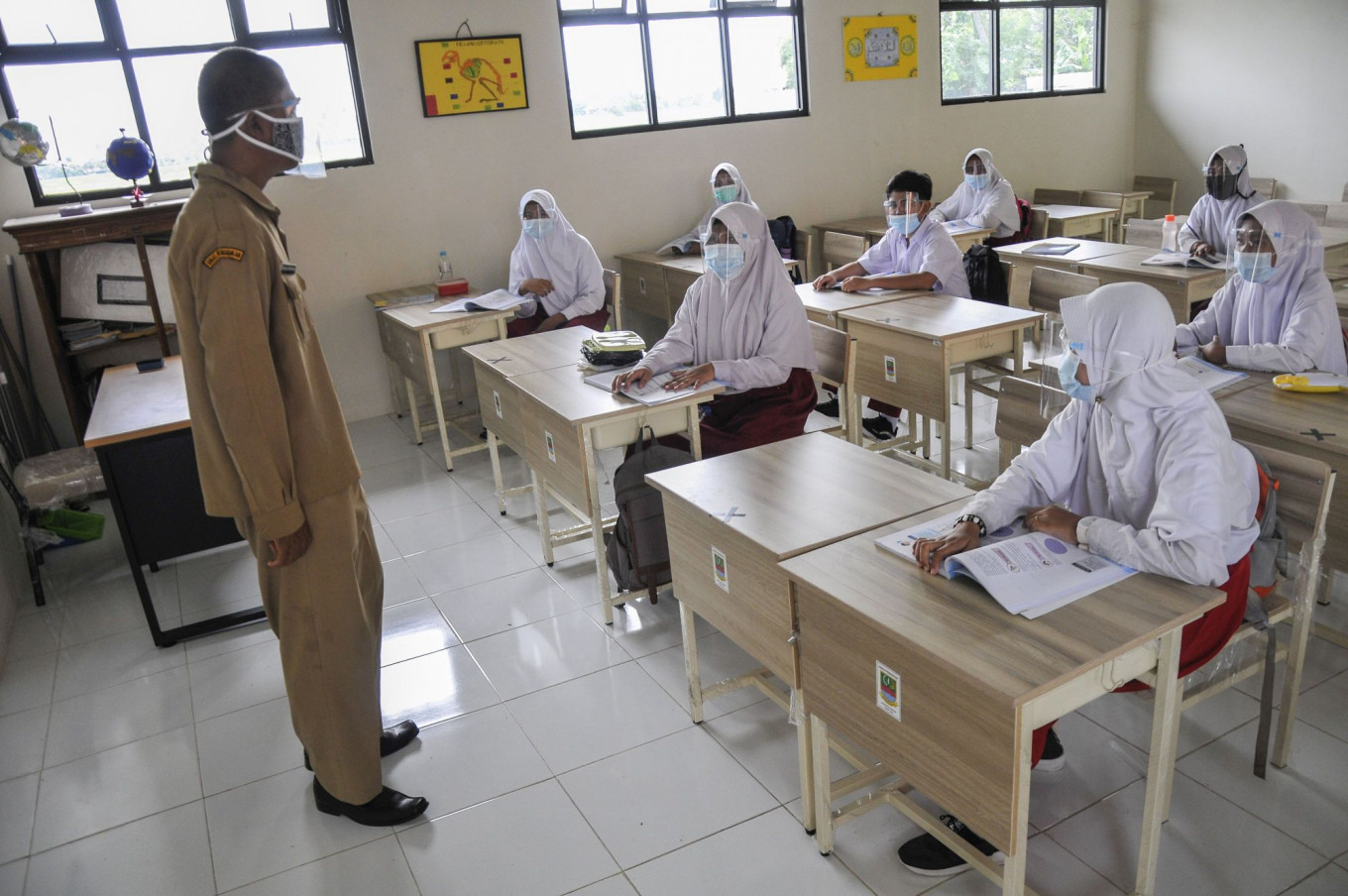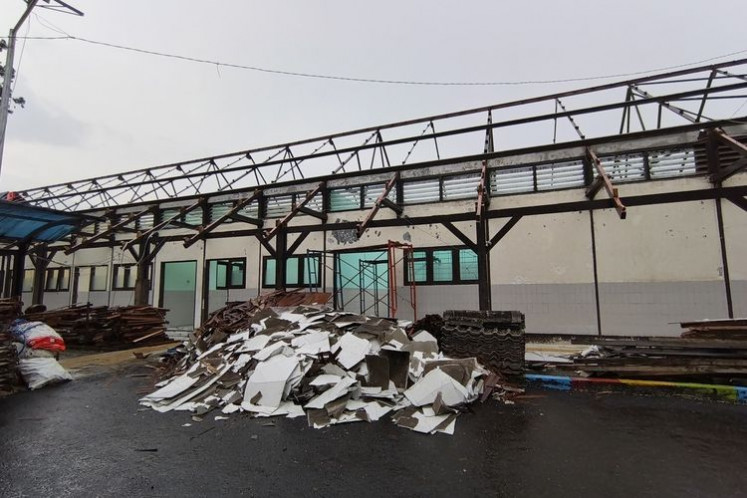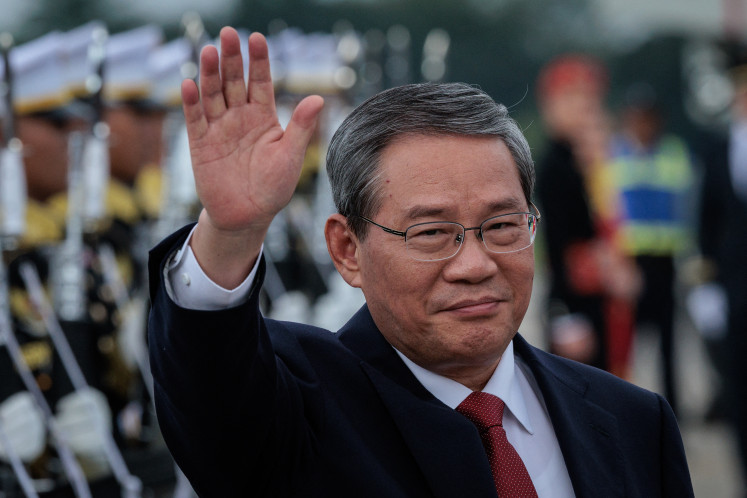Government pushes for school reopening
RI among few Asia-Pacific countries not to reopen schools
Change text size
Gift Premium Articles
to Anyone

T
he government has ordered schools that have completed vaccinating their teachers, administrators and staff members to immediately resume in-person learning, aiming to fully reopen schools across the country for the new academic year in July.
While some epidemiologists believe that schools can reopen safely, teachers are cautious about the plan as vaccination drives remain sluggish and schools are struggling to provide the necessary infrastructure to implement health protocols.
The decision for immediate school reopening was issued last Tuesday through a joint decree signed by the education minister, health minister, home minister and religious affairs minister, who oversees madrassas and Islamic boarding schools (Pesantren).
Education and Culture Minister Nadiem Makarim said resuming in-person classes as soon as possible was necessary as prolonged school closure could potentially cause lasting harm to a generation of children, including future loss of earnings and exacerbating education and economic disparities.
"A year of school closure is already too long. [...] We need to take immediate action to prevent permanent [negative] impacts on students that may lead to a generation that's left behind," he said.
He noted that since schools moved online in March last year due to the pandemic, Indonesia has seen a "worrying" increase of children dropping out of schools and a surge in subject failures, domestic abuse and mental health problems among students. The trend is more prevalent among lower-income families and those living in remote regions who are struggling to have access to online learning due to the digital divide.
Read also: Teachers go extra mile to teach students as schools remain closed
Nadiem is confident that schools can safely reopen under strict health rules, with students being required to take turns attending in-person and virtual classes during the initial stage of school reopening. The number of students in each class will be limited to 18, or roughly 50 percent of the previous capacity, and all students must maintain a physical distance and wear masks.
During the first two months after reopening, schools are not allowed to sell or provide food out of their canteens. Physical education classes and extracurricular activities are also prohibited.
Schools are also required to provide facilities to support health protocol enforcement, including clean toilets, handwashing facilities, disinfectant, thermo guns and access to health facilities.
Epidemiologist Dicky Budiman said it was about time Indonesia reopened schools, especially considering that other sectors, such as offices, entertainment venues and shopping malls, had fully resumed operations for quite some time.
He said based on standard international pandemic responses, schools should be the last to close after all other mitigation measures in the community had been employed and the first to reopen when they could do so safely.
This implies that schools should be prioritized for reopening and remaining open for in-person instruction over nonessential businesses and activities.
“Closing schools when most other sectors are open will not have any significant impact on curbing the virus. At this rate, the harm of closing schools outweighs its benefits,” Dicky said, adding that research showed that schools that had implemented strict health rules could reopen safely and remain open.
Indonesia is among four out of 27 countries in the East Asia and Pacific region that have not fully reopened their schools.
The government has allowed the phased reopening of schools that are located in areas with low COVID-19 risks since July last year, before giving discretion to local administrations to reopen schools — regardless of their risk level — starting from January this year. Yet only 22 percent of schools nationwide had conducted in-person classes by March.
Read also: Parents, experts urge govt to reconsider 'rushed' school reopenings in July
Even though reopening is now mandatory for schools that have met the requirements, parents have the final say on whether they will allow their children to attend classes on campus. Schools can also be closed again should there be any COVID-19 transmission on school premises or if local administrations implement stricter mobility restrictions.
Nadiem now urges local administrations, which are responsible for organizing vaccination programs in their jurisdictions, to step up their efforts and complete the inoculation of kindergarten and elementary school teachers by the second week of May and secondary school teachers by the end of May.
Besides the fact there are no COVID-19 vaccines available for children, Nadiem said teachers should get higher priority for inoculations because they have a higher risk of severe symptoms compared to children.
While children are as likely as adults to catch COVID-19, their mortality rate is the lowest compared to other age groups and they are less likely to be the main transmitter of the virus, according to Dicky. The average global COVID-19 mortality rate for children is one in 3,500 cases, while in adults it is one in 60.
Government data shows that by Tuesday, around 181,000 school-age children have contracted the virus, or 14 percent of total confirmed cases nationwide.
Satriwan Salim from the Association for Education and Teachers (P2G) said vaccination remained sluggish for teachers and education staffers, especially among those working in private schools.
He also doubted whether all schools would have the infrastructure necessary to implement health protocols by July, even though the government allowed state and private schools eligible for operational aid (BOS) to use the government fund to prepare for reopening.
“Many headmasters are still worried about [being perceived as misusing] BOS funds when using them for preparing health protocols, despite the flexibility,” he said.
Read also: Remote learning takes mental health toll on children, parents
The Education and Culture Ministry set up late last year an online dashboard accessible to the public to track whether schools have safety facilities and health protocols in place. Over 530,000 state and private schools are required to self-assess their readiness to reopen, but as of Wednesday, only half of them have filled in a survey available on the dashboard.
Among those that have submitted a response, tens of thousands do not have clean toilets, handwashing facilities, disinfectants, thermo guns and access to health facilities; nor do they a mask-wearing mandate. Over 150,000 schools do not have data on teachers, staffers and students who have comorbidities, nor access to transportation that allows social distancing.
Saur Panjaitan from the Indonesian Private Education Forum Body (BMPS) said private schools that had many students from low- and middle-income families had been the hardest hit by the pandemic, thus they used BOS funds to pay for teachers' salaries amid the reduced income. While welcoming the reopening plan, he said the government should provide other funding assistance to affected schools so they, too, can procure and install health facilities.









